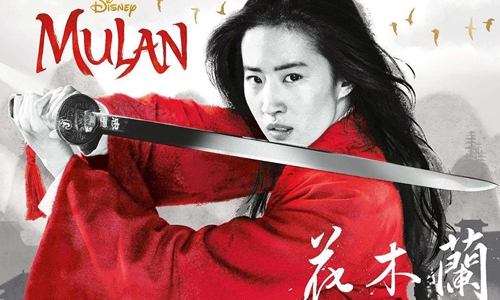Chinese moviegoers' complaints about ‘Mulan’ shows high expectations for Disney film
By Gong Qian Source: Global Times Published: 2020/9/8 22:45:31

Poster of Mulan Photo: Maoyan
With Disney live-action film Mulan scheduled to hit theaters in the Chinese mainland on Friday, it has captured the full attention of Chinese social media. However, with this high anticipation also come high expectations for the film, leading to Chinese netizens to carefully scrutinize it to see if the Western-produced English-language film can successfully depict traditional Chinese culture.
For example, a hashtag about the titular character Mulan’s makeup had earned 150 million views on China’s Twitter-like Sina Weibo as of Tuesday. A certain group of Chinese netizens have jeeringly pointed out that the makeup of the female characters in Mulan looks closer to that of court ladies in the West during the 17th century, rather than the style popular during China’s Northern and Southern Dynasties (386–589).
“The female characters’ makeup in Mulan reminds me the royal family living in Versailles, France during the 17th century. And the armor that actor Donnie Yen wears makes me think of the style of the Warring States period in Japanese history,” one Chinese netziens posted on Sina Weibo.
“Although it is a Chinese historical story, the movie is full of exotic flavors and is very fresh to me as a Chinese. I think the filming team did not put in much effort to research Chinese history or culture,” complained another netizen, who watched the film after it released on streaming platform Disney+ in the US, complained.
While some Chinese have issues with the makeup in the film, it has become something of a popular trend outside of China. Several makeup bloggers have been posting video or photo tutorials to teach people how to do their makeup in a similar fashion, while others have even attempted to recreate Mulan’s entire costume.
This trend is the perfect example of the idea that culture has no borders, and beauty does not have a single standard.
The film has not only attracted people’s interest in makeup, but also has inspired people to learn more about the original work upon which the film is based. The Ballad of Mulan, written during the Northern Wei Dynasty (386-534), mainly describes the story of Mulan joining the army in place of her father. Some Chinese netizens joked that, out of curiosity, they wanted to listen to foreigners recite the work.
Some discussions have suggested that the movie is doing all it can to appeal to Chinese audiences.
Defending one’s home and motherland has always been considered a responsibility and honor in the hearts of the Chinese people, which is why Chinese people have always been fond of heroes such as Mulan, the Eight Hundred Heroes in the war epic The Eight Hundred and Zhong Nanshan, the top epidemiologist who was on Tuesday awarded the Medal of the Republic for his efforts in combating the COVID-19 epidemic.
Their love and respect of these great heroes can be seen in the stellar box office of the blockbuster The Eight Hundred, which reached 2.4 billion yuan ($350 million) in just 19 days.
A source close to one of the investors in The Eight Hundred told the Global Times that she never expected the war epic to feature so many touching moments. She added that after she saw the film, she saw a veteran stand up and salute the screen as the audience was leaving the theater.
Although box office is not a direct indicator of a film’s quality, it still can reflect something. If Mulan fails to win the hearts of Chinese moviegoers and does poorly after it premieres, Hollywood will need reflect on its understanding of Eastern culture.
Posted in: FILM,ARTS FOCUS